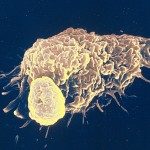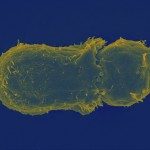Link to Pubmed [PMID] – 12938231
Eur. J. Immunol. 2003 Sep;33(9):2551-6
The antigen dose conditions the functional properties of CD8(+) T cells generated after priming. At relatively low antigen doses, efficient memory T cells may be generated, while high antigen doses lead to tolerance. To determine the mechanisms leading to such different functional outcomes, we compared the proximal TCR signal transduction of naive cells, to that of memory or high-dose tolerant cells generated in vivo. In vivo activation led to the constitutive phosphorylation of CD3epsilon, recruiting Zap70, in both memory and tolerant cells. In tolerant cells, these phenomena were much more marked, the CD3epsilon and zeta chains no longer associated, and the Src kinases p56Lck and p59Fyn were inactive. Therefore, when the antigen load overcomes the capacities of immune control, a new mechanism intervenes to block signal transduction: the recruitment of Zap70 to CD3epsilon becomes excessive, leading to TCR complex destabilization, Src kinase dysfunction, and signal arrest.


